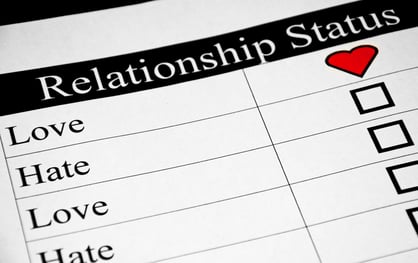
Imagine scripting a perfect day with your partner...
You set out on a hike on a beautiful Sunday morning, take a dip at a refreshing waterfall with no one around, snack on the fruit salad and sandwiches you prepared together, and – feeling connected and energized – you head back home.
And then one of you says something. Maybe your husband says, “Why can’t we do this all the time?” While the words alone might seem innocent enough, you hear something else. You infer from the tone his “never-ending” complaint that you work too much. Suddenly, the adrenaline and cortisol pump through your veins, and you react, “Maybe we could if I didn’t have to work so much to pick up your slack.”
In a flash, THAT moment defines the day. And after a few more choice exchanges, that moment defines the next few days as you both retreat into bitter silence.
Humans have what is known as a “negativity bias.” In short, the bad stuff outweighs the good stuff. We gravitate towards and dwell on the one thing that did not go well rather than the five things that did go well. It’s all too common for this negativity to consume our relationships and distort our thinking.
In committed relationships, especially, compliments dwindle, and tones get harsher. We become less forgiving and loving and more critical and shaming. The charming blemishes we may have embraced early on transform into glaring character flaws.
We now know something about the origins of this sensitivity to the negative: Any negative message – words, tone, facial expression – triggers our survival drive, and that triggers our anxiety. When we are scared, we automatically protect ourselves by withdrawing from the scene or countering it with a put down. And that makes everything worse.
Because of this, when couples come to our workshops, they are unable to see beyond what their partner is doing wrong. They are stuck in this negativity bias (anxiety about what might happen to them) and have one goal for being there: to have their partner “see the light” (of all their wrongdoings) and “be fixed,” oblivious to their own contributions. It’s why we immediately move into one of our core teachings around intentionality.
We need to strengthen the intentional muscle in order to override the reactive muscle. One way to do this is through the appreciation process. Appreciations help us slow down the reactivity by engaging the prefrontal cortex, the part of our brain which regulates anxiety. Focusing on what your partner is doing right can be very powerful. The more you focus on the good, the more of the good there will be to focus on. Energy follows attention.
Here are three tips to help:
Tip #1 - Be mindful of what’s going well in your relationship and what your partner is doing right.
This not only includes what you say to your partner but how you think about your partner. Thoughts magnify the experience.
Tip #2 - Make a list of everything you appreciate, admire, and love about your partner.
Include everything from physical attributes to personality traits to behaviors. Continue adding to the list regularly.
Tip #3 - Every day share at least three appreciations.
Share from your list or something you noticed that day. Tell your partner what you love and appreciate about them. Start by saying, “One thing I appreciate about you is….” And deepen the appreciation by sharing, “When you do that, I feel….” This ritual of appreciations can transform relationships. A hidden benefit of this rule is that we can discover many wonderful things about each other.
Most of us are guilty of falling into the trap of negativity. It can, at times, take an enormous effort to use the muscles we so seldom used. It’s much easier to be reactive and negative. It’s much harder to be intentional and positive. At least at first. Once we overcome the ingrained bias, like any atrophied muscle, intentionality becomes stronger and automatic. Appreciations flow. Relationships thrive, and we begin to identify each other as a source of pleasure once again.
If you are struggling with a negative bias in your relationship, we're here to help. Check out our Imago Relationship Workshops and Relationship Therapy. We also have Online Couples Therapy and Online Couples Workshops right now!
Discover more about Imago with our Imago Professional Membership, Imago Professional Facilitators, Imago Professional Training and Imago Educational Webinars.
 This blog post was written by This blog post was written by Harville Hendrix, Ph.D. and Helen LaKelly Hunt, Ph. D.
This blog post was written by This blog post was written by Harville Hendrix, Ph.D. and Helen LaKelly Hunt, Ph. D.
Relationship experts and NY Times best-selling authors Helen LaKelly Hunt, Ph.D., and Harville Hendrix, Ph.D., are the co-creators of Imago Relationship Therapy, practiced by thousands of therapists in over 37 countries.
Combined, they have written over 10 books, including three New York Times bestsellers. Dr. Hendrix has appeared on the Oprah Winfrey show 17 times and Oprah affectionately calls him the “marriage whisperer.”

